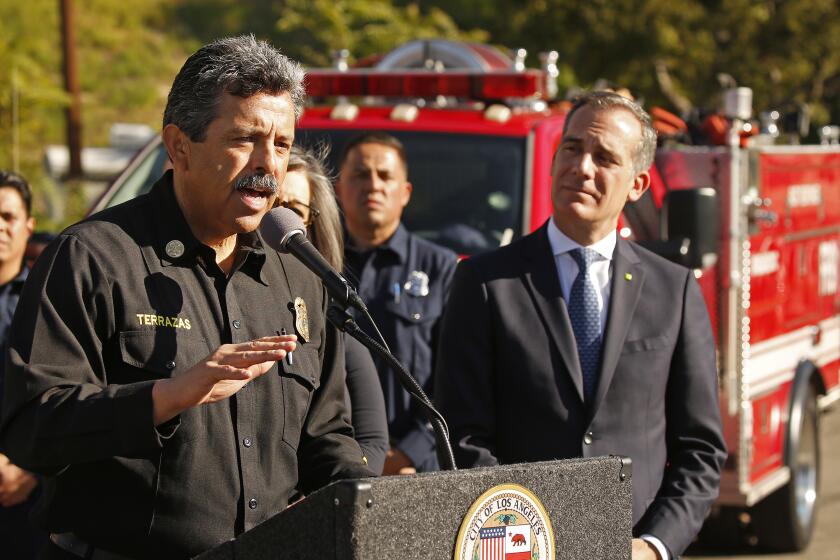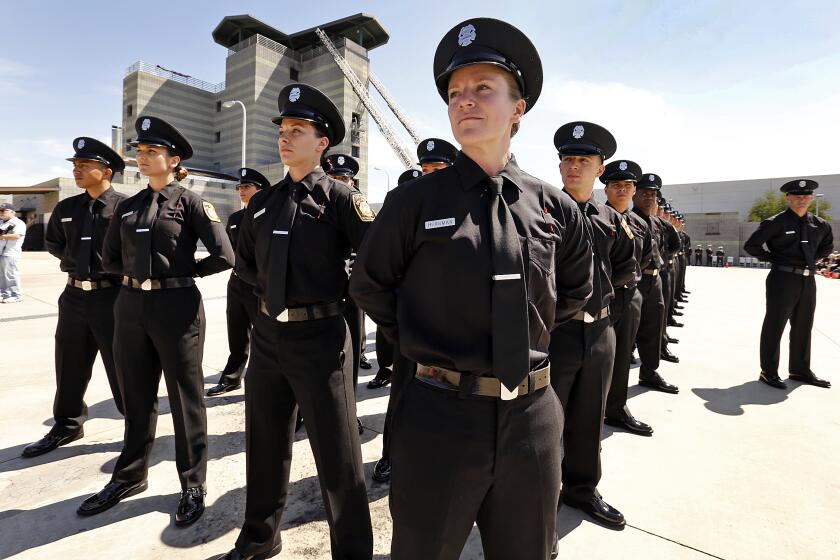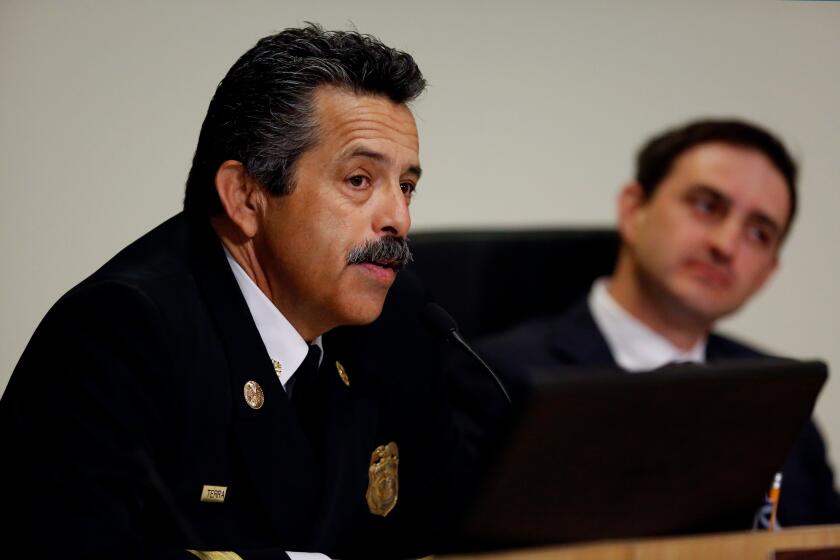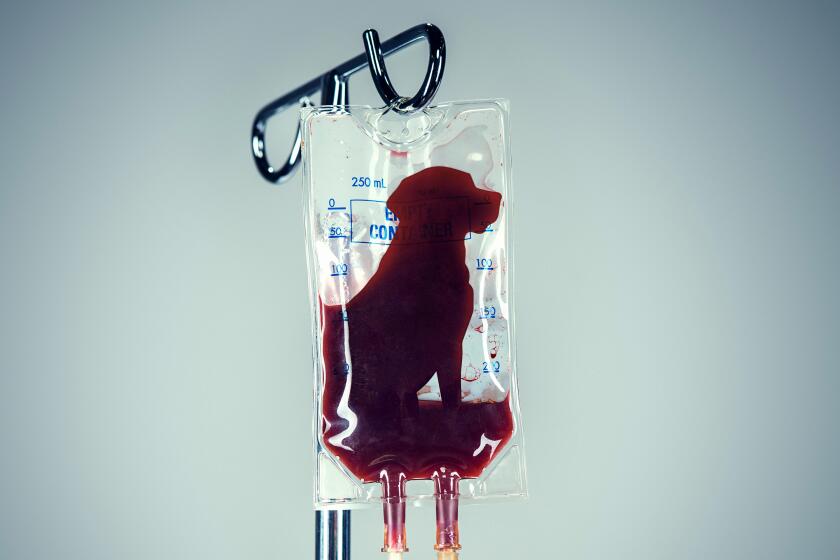LAFD chief deputy allegedly drunk during a major fire gets no discipline, $1.4-million payout

- Share via
Last spring, a high-ranking official in the Los Angeles Fire Department alleged that its top administrative commander, Chief Deputy Fred Mathis, appeared to be intoxicated while he was overseeing the agency’s operations center during the Palisades fire.
The officer reported that Mathis admitted to her that he had been drinking, according to LAFD records.
Now, The Times has learned that a private law firm hired by the city to investigate the May 18 episode found that Mathis was likely intoxicated at the department’s headquarters at City Hall East.
But the investigation cleared Mathis through a rationale that has outraged department insiders: The law firm concluded Mathis “was technically off duty while he was likely intoxicated as he had put himself out sick” that day, according to a summary of the findings the department provided The Times. The newspaper reported in July that an entry was made in Mathis’ timekeeping record four days after the incident to show he was on sick leave the day he was reported to be drunk on duty.
Mathis told The Times in an email that he did nothing wrong and was treated unfairly by the department.
The heads of three organizations for Black, Latino and women firefighters say the Mathis case is just the latest example of the department granting special treatment to senior officers, especially if they are men or white, as Mathis is. And the leaders of the groups say that treatment is often accompanied by a cover-up, sometimes with the help of elected officials — among them Mayor Eric Garcetti and City Atty. Mike Feuer, a candidate for mayor — who fear crossing the LAFD’s politically influential union bosses.
The L.A. Fire Department’s top administrative commander reportedly appeared to be intoxicated at work during the Palisades fire, records show.
Two members of the Fire Commission, the five-person civilian panel that oversees the department, echoed the criticism of how the Mathis investigation was handled and said complaints about disparate treatment and a lack of accountability in the leadership ranks have become an entrenched pattern.
“Now, every rule is based upon who you’re applying it to,” Commission President Jimmie Woods-Gray said.
An LAFD spokeswoman would not answer numerous Times questions about the Mathis findings, including one that sought to clarify whether he declared himself on sick leave before or after he was reported to be intoxicated. The department and Garcetti’s office also would not release the law firm’s report or many other records in the Mathis case. Garcetti’s office did not respond to a request for comment. Feuer, whose office made the decision to farm out the investigation to the law firm, declined to be interviewed or to comment. So did his spokesman, Rob Wilcox, who is running for city controller.
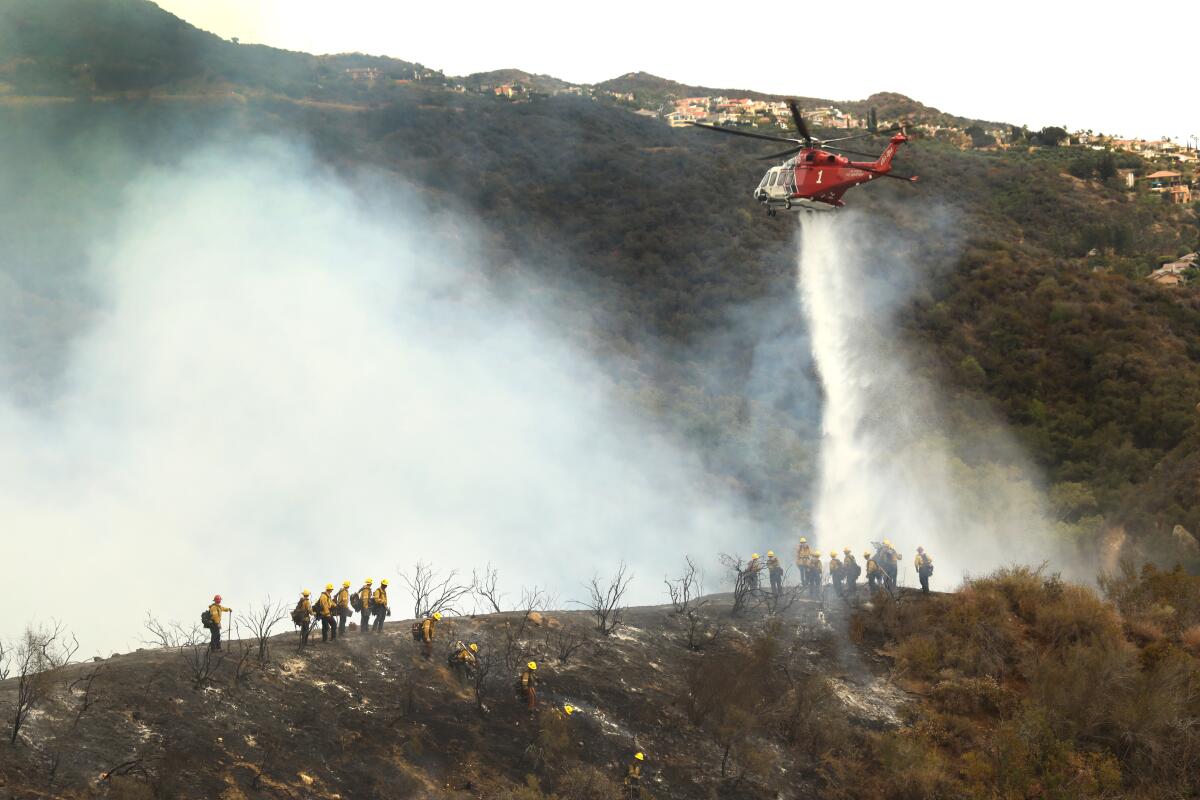
Because he retired within days of the investigation’s conclusion in late January, Mathis, whose salary was more than $350,000 a year, could not have been disciplined. He left the department with a roughly $1.4-million payout, on top of his annual pension of about $225,000, according to the city. Mathis spent his last seven months with the LAFD on paid leave for what the department said was “continuous trauma to an extremity.” The nature of the trauma was not detailed.
The law firm’s summary of findings also cleared Mathis of allegations that he might have misused his LAFD credit card and confidential information about the investigation after he went on leave. An unnamed person raised questions about the credit card, and The Times reported in November that Mathis accessed the LAFD’s complaint tracking system, which contained sensitive material about his case, including the names of witnesses.
Deputy Chief Fred Mathis was under investigation for allegedly being intoxicated at work when he accessed the LAFD’s complaint system, according to the department.
The summary said “there is no evidence” Mathis misused the credit card, and the concern that he might have done so was based on an “incorrect belief that Mathis was administratively detailed home for substance abuse.” Last year, the department said the investigation was examining an allegation that Mathis misused his city vehicle while on injury leave, but the summary did not address that. The department did not answer a question of whether Mathis was allowed to use the card while on injury leave.
Regarding the complaint tracking system, the law firm, Yasinski & Jones of Pasadena, said Mathis admitted accessing it while he was under investigation. But the firm added that “while certainly suspicious, and not good optically or ethically, without evidence that Mathis misused the information he gleaned from his CTS file to influence the investigation, it is also unclear what LAFD rules or regulations his admitted conduct violated.”
Mathis declined to be interviewed. In a written response to emailed questions from The Times, he said, “All of the allegations you have presented to me are false and unsubstantiated through the investigation initiated by the department.”
He acknowledged that he was struggling with alcoholism at the time, and he contended that his privacy was violated and his reputation damaged when Fire Chief Ralph Terrazas discussed his need for treatment with other department officials and the firefighters union.
“Did I make mistakes dealing with my alcoholism?” Mathis wrote. “Certainly, but I don’t apologize for having a disease that I continually fight everyday. I never reported to duty impaired and my work was never impacted by my addiction.”
He added that he is “working towards a year of sobriety” and wants to “help firefighters recognize the risk of substance abuse and to seek treatment without the fear of being maligned or retaliated against. Something I was not afforded.”
The announcement by the U.S. attorney’s office comes amid calls by groups representing Black, Latino and female firefighters for an investigation into allegations of discrimination against L.A. city fire employees.
Terrazas, who is retiring this month, and his successor, Deputy Chief Kristin Crowley, declined to be interviewed. In an emailed response to Mathis’ accusations against him, Terrazas said, “The Department systematically adheres to established investigative protocols, for any member, no matter what rank or position in the Department. Included within these protocols is the element of confidentiality. At no point was confidentiality violated during this investigation.”
The Mathis probe played out just as department critics had predicted. In July, after The Times disclosed the complaint about Mathis being inebriated, they said the LAFD and Feuer would see to it that the investigation dragged out until the statute of limitations for alleged misconduct expired or Mathis retired, ensuring he would not be punished. The critics also predicted that any report on the inquiry would be buried.
Battalion Chief Kris Larson, who is the department’s highest-ranking Black woman and president of the Los Angeles Women in the Fire Service, was among those who foretold the outcome of the investigation. “As soon as they gave it to a private law firm, I knew exactly what was going to happen — absolutely nothing,” she said recently. “This goes to the overall problems in the department.”
Larson and others said lower-ranking and nonwhite department employees have been suspended or fired for being drunk at work. “If it were me, as an African American female. I would be put on 60 days off leave — suspension — with no pay,” she said.
Capt. Phillip Dominguez, interim president of Los Bomberos, a group of Latino firefighters, said, ”For that investigation to take so many months, it’s just embarrassing. For anyone else, it would have been handled immediately. It really is disappointing for the whole department.”
Regarding Feuer, Dominguez said, “I don’t know why he punted this away.”
“It just doesn’t look real good,” said Gerald Durant, president of the Stentorians, the Black firefighters group. “Is the city attorney an advocate for us? This is what happens in the Fire Department.”
As an example of what it says is unequal treatment in the department, the Stentorians have cited the case of a former Black firefighter who was forced to resign last year after being accused — falsely, the firefighter asserted — of missing a mandatory Alcoholics Anonymous meeting.
L.A. Mayor Eric Garcetti has made increasing the number of women in the Fire Department a major goal. Some senior women in the LAFD, and his own appointees, say the mayor could be pushing harder.
In response to an interview request, Freddy Escobar, president of the United Firefighters of Los Angeles City, which represents rank-and-file firefighters, said in an email that the union “believes that all discipline matters within the LAFD should be handled fairly regardless of the rank, gender, or ethnicity of the firefighters involved.”
The LAFD union that represents chiefs, including those of Mathis’ former rank, did not respond to an interview request.
Woods-Gray, the Fire Commission’s president, said the department must “work on establishing a line of credibility — to show the public we do have rules and we follow the rules.”
“The best thing that could happen to the Fire Department is to blow it up and start over again,” she added. “You can’t fix it.”
Commissioner Rebecca Ninburg said the Mathis affair is “just a beautiful example of what this department has been able to get away with and why we need stronger oversight.… Our politicians have shown us time and again that they will not hold this department accountable.”
Like the leaders of the minority and women’s organizations, Ninburg said the federal government should conduct a broad investigation of the department’s actions. In August, the U.S. Justice Department said that it was “carefully reviewing” allegations that the LAFD has engaged in civil rights violations in its treatment of employees.
The Times has learned that several current and former members of the LAFD have since been interviewed by federal investigators. The Justice Department has declined to comment.
Former Assistant Chief Patrick Butler, who retired last year, was among those who called for the federal inquiry. He said the department should be placed under a federal consent decree that would allow the government to ensure that reforms are imposed. “If you look back on the last eight years of the mayor’s and fire chief’s tenure, you will see a legacy littered with corruption, cover-ups and blatant discriminations,” Butler said.
The demand for a federal investigation follows a Times report on allegations that a high-ranking white official received preferential treatment after he was reported to be under the influence of alcohol or drugs while on duty.
In June, six Black employees in the Fire Prevention Bureau, which is responsible for safety inspections and investigating the causes of fires, sued the city, alleging the LAFD is governed by a “good old white boys club” that discriminates in granting promotions. A Times report in July examined complaints that Garcetti has failed to keep his promises to significantly expand the ranks of women firefighters and overhaul a department in which women and nonwhite firefighters tell of being bullied.
In November, a survey of the department showed that 56% of sworn women employees said bullying and harassment occurred in the LAFD. It also found that 47% of Black employees said “perceived discrimination” was a source of conflict in the department. About a third of the department’s 3,700 employees took part in the survey, which was conducted by Deloitte.
A white firefighter was suspended for 12 days after The Times reported in 2020 that he struck a Black man in the head and pulled a towel tightly around his face while he was restrained on a gurney. The incident had been kept under wraps for 17 months.
A Los Angeles firefighter who punched a restrained detainee in the head has received a 12-day suspension for his actions, according to department records reviewed by The Times.
That same year, an assistant fire chief, Ellsworth Fortman, was charged with hit-and-run driving after he allegedly crashed his personal pickup truck into a light pole and another vehicle and then drove home. Fortman did not respond to sheriff’s deputies who knocked on his door and demanded to speak to him, according to a sheriff’s sergeant. While the criminal case was pending, he remained on duty and managed a coronavirus testing program for the city, a lucrative assignment that paid him tens of thousands of dollars in overtime, payroll records showed.
The Los Angeles County Sheriff’s Department is investigating a hit-and-run case in which an assistant chief for the Los Angeles Fire Department allegedly crashed into a parked car in Santa Clarita and fled to his nearby home.
Fortman eventually entered into a diversion program that required him to make restitution for the damage he caused, perform community service and attend Alcohol Anonymous meetings in exchange for the dismissal of the charges.
The department initially did not respond to a question of whether Fortman had been disciplined. But after The Times learned last week that Fortman had decided to retire, LAFD spokeswoman Cheryl Getuiza said the department was preparing to have him face a disciplinary hearing earlier this month. But with his retirement — his last day of work was Saturday — Fortman avoided potential discipline.
Getuiza provided no details of the allegations or discipline he would have faced at the hearing. Fortman and his attorney declined to comment.
In 2019, the department’s chief spokesperson at the time, Peter Sanders, who is white, was accused of using a city car to stop and threaten an Uber driver at a Trader Joe’s in Studio City. Through Feuer’s office, Sanders was allowed to enter a diversion program to avoid a possible criminal charge. Sanders, who left the department last year, said he was not disciplined.
Peter Sanders, a civilian employee and chief spokesman for the Los Angeles Fire Department, is accused of using a city vehicle to stop and threaten an Uber driver who got into a shouting match with Sanders’ wife in a parking lot, according to a police report The Times obtained.
As commander of the department’s administrative bureau, Mathis was responsible for responding “to major emergencies and other incidents as head of an Incident Management Team” and for conducting “pre-disciplinary hearings and making appropriate recommendations to the Fire Chief of corrective action,” according to the LAFD website.
The retirement payout for Mathis, who worked for the LAFD for more than 35 years, included nearly $293,000 in what the department said was unused time off for illness, holidays and vacation. He also received about $1.1 million that the city put aside while he was enrolled in a controversial program that aims to keep police officers and firefighters on the job past retirement age. The program allows them to collect their regular salary for up to five years while placing their pension checks in an interest-earning account for a payout when they leave.
The complaint about his alleged intoxication, which was filed electronically, stated that a battalion chief “witnessed Chief Deputy Fred Mathis exhibiting signs of intoxication, while on duty at City Hall East.” It also said that Mathis was “alleged to have admitted” that he had been drinking.
Another high-ranking officer told The Times that a second employee informed him that Mathis appeared to be intoxicated. LAFD rules require the agency to act promptly if there is a reasonable suspicion that an employee is under the influence, including by ordering the employee to provide a urine sample for testing.
In the Mathis case, the complaint about his condition was not filed for three days. The day after that, the entry was made in his timekeeping record to show he was on sick leave May 18 and 19. The department has refused to say whether Mathis submitted to a urinalysis.
In refusing to release the law firm’s report and other records requested by The Times, the LAFD has asserted that they’ve been withheld to protect Mathis’ privacy rights. But legal experts say California courts have held that such records must be disclosed when they involve serious allegations of wrongdoing by a high-ranking public official, even if the official is exonerated.
“The position that they’re not required to disclose the documents is pretty egregious,” said David Snyder, executive director of the San Rafael, Calif.-based First Amendment Coalition, a nonprofit that advocates for government transparency. “It’s just wrong. The California courts have decided that for high-ranking public officials, the privacy exemption is waived.”
More to Read
Sign up for Essential California
The most important California stories and recommendations in your inbox every morning.
You may occasionally receive promotional content from the Los Angeles Times.

